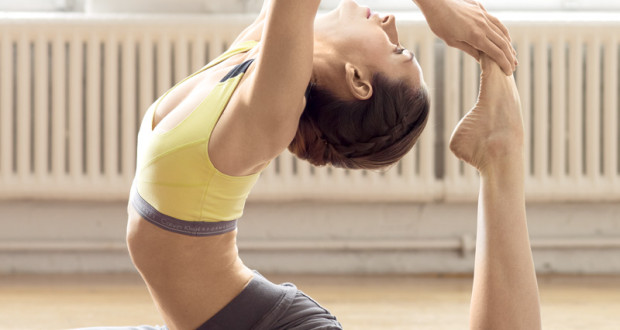By: Red Hot Mamas
Published: September 19, 2008
As we know, menopause is a natural, biological process that most women will experience between the ages of 40 to 60. Menopause is not an illness and does not always require medical treatment. However, incorporating at midlife lifestyle modifications, like the practice of yoga, will enhance overall health and ease the physiological, mental and emotional transition through menopause.
At any age, yoga can benefit both the body and the mind, bringing energy and balance. More specifically, yoga can be extremely helpful to peri-postmenopausal women because hormonal levels and body chemistry may be influx. Yoga exercises level out this physiological instability by relaxing and stretching every muscle in the body, promoting better blood circulation and oxygenation to all cells and tissues. As a result, the function of the endocrine glands and the organs of the female reproductive tract is optimized. Yoga also improves the health and well-being of the digestive tract, nervous system, and all other organ systems.1
To further the case for yoga, researchers from India recently reported that yoga can reduce hot flashes and night sweats among women going through menopause, and also appears to sharpen mental function.2 To investigate whether yoga would help women with symptoms of menopause, the researchers randomly assigned 120 women, 40 to 55 years old, to yoga practice or simple stretching and strengthening exercises five days a week for eight weeks. In addition to participating in specific postures and breathing exercises, women in the yoga group also listened to lectures on using yoga to manage stress and other yoga-related topics. Women in the other group heard lectures on diet, exercise, the physiology of menopause, and stress.
At the end of the study, women in the yoga group showed a significant reduction in hot flashes, night sweats, and sleep disturbances, while the women in the control group did not, Dr. R. Chattha, of the Swami Vivekananda Yoga Anusandhana Samsthana in Bangalore, India, and colleagues found. Both groups showed improvements in attention and concentration, although improvement in the yoga group was significantly greater. In a test of memory and intelligence with 10 components, the yoga group improved on eight, while the control group improved on six.
Yoga instructor Patricia Walden, 57, knows firsthand how yoga can help temper menopausal complaints.3 Like many other women, she suffered full-fledged symptoms of hot flashes, constant fatigue and insomnia. On the days when Walden had intense symptoms, she found she needed to modify her yoga routine.
During the menopause transition, Walden suggests incorporating more cooling and restorative poses.4 Any gripping or tension in the body can make hot flashes worse, so using props such as bolsters, blankets, and blocks to help support the whole body is a good idea. If insomnia is a problem, inversions can sometimes help, because they ground the body’s energy and burn off excess anxiety. When followed by restorative postures, they encourage a deep state of rest.
A regular yoga practice can make a world of difference in a woman’s experience of menopause. And a solid practice before this phase can ease the transition, says Suza Francina, author of Yoga and the Wisdom of Menopause (Health Communications, 2003).5 “If you practice yoga before menopause, then all the poses that are especially useful for coping with uncomfortable symptoms are already familiar, and you can reach for them like an old friend,” she says. “If you are familiar with restorative poses, then you have the best menopause medicine at your disposal.”
If yoga sounds like it might help ease your menopause experience, just an hour of practice three times a week is enough to make a difference. Make a commitment to yourself to take two or three classes a week for a month, then assess how you feel. To find a yoga class or studio in your area, visit www.yoga.com. Namaste.
References:
1 http://www.healthy.net/scr/Article.asp?Id=1370
2 http://news.yahoo.com/s/nm/20080822/hl_nm/yoga_dc
3 http://www.yogajournal.com/health/1139?page=3
4 http://www.yogajournal.com/health/1139?page=4
5 http://www.yogajournal.com/health/1139?page=3
{rt}
 Red Hot Mamas In Charge of Change.
Red Hot Mamas In Charge of Change.




